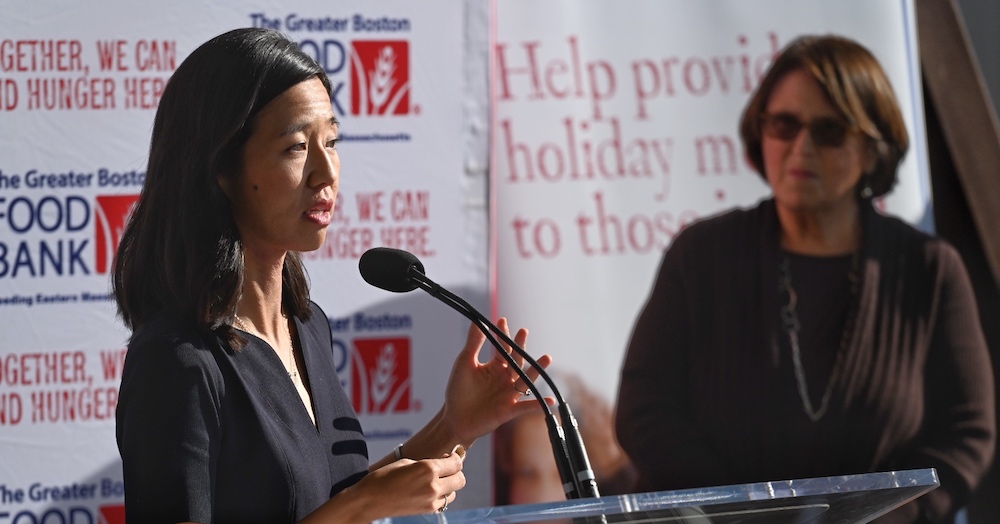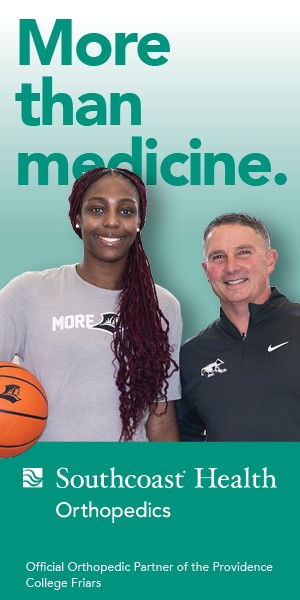latest
Unvaccinated Creating “Ripple Effects” In Health Care, Wu Says

By Chris Lisinski
The winter COVID-19 wave continues to wreak havoc on Boston’s education and health care systems, prompting more than 1,000 school staff absences and straining already-burdened hospitals to a point that could create “ripple effects” on all kinds of patients, Mayor Michelle Wu said Wednesday.
As Tufts Medical Center officials declared that the “vast majority” of patients being treated for the most serious COVID-19 cases have not been vaccinated, Wu warned that holdouts are creating health risks for everyone else who may see their treatment delayed or altered.
“Gaps in vaccination rates are affecting everyone,” Wu told reporters outside the hospital. “If you are looking to get a hip replacement, if you have some other procedure that has been bothering you but is not an emergency, these are getting pushed back and we are seeing the ripple effects on everyone as we drag this out without closing vaccination rates.”
The omicron variant has fueled a dramatic increase in confirmed infections over the past two months. More than 5 million Massachusetts residents are fully vaccinated, which has helped limit serious illness and death, but the wave continues to put pressure on hospitals, who are treating almost as many patients with COVID-19 as they were a year ago.
Health care workers, Wu said, are “exhausted” after nearly two years of caring for patients under the strain of a pandemic.
Tufts Medical Center President and CEO Michael Tarnoff said his facility is facing a “perfect storm” of surging infections, staff unable to work because of their own illnesses, and a high number of patients who need acute care.
“We’re managing our throughput, but it’s difficult every day, it’s difficult every hour,” Tarnoff said. “Clearly, from a COVID viral perspective, it’s now a disease of the unvaccinated and that is preventable and it needs to end. But the delay of care that we’re having to do for otherwise healthy patients who are trying to come in for health care is only making the situation worse over a prolonged period of time. Every time we have to delay care for patients that need it, they get sicker and that burdens the system further.”
On Dec. 21, the Department of Public Health ordered hospitals with less than 15 percent medical-surgical and intensive care unit bed availability to postpone or cancel non-essential, non-urgent procedures likely to result in inpatient admissions in an attempt to free up capacity.
Helen Boucher, an infectious disease expert and interim dean of Tufts University School of Medicine, said “most” patients admitted to Tufts Medical Center with COVID-19 are unvaccinated. For those sick enough to go to the intensive care unit, Boucher said “the vast majority, almost 90 percent,” have not received a vaccine against the virus.
“The number one thing you can do for yourself, your family and the community is to get that vaccine,” Boucher said. “We know that the booster and the vaccine prevent against serious illness or death, and that’s going to help us be able to care for the patients who need us — those with COVID and those with other things.”
Almost every industry, from airlines to retail stores, has been grappling with staffing shortages as the omicron variant has torn through workforces.
Most Massachusetts schools reopened this week after the holiday break, and some districts have turned to delays or cancellations to provide more time for employees to use state-provided COVID-19 tests or to cope with high volumes of teacher absences.
Boston Public Schools had more than 1,000 of its 46,000 staff out sick on Wednesday, including 650 teachers, Wu said.
The depleted workforce prompted Superintendent Brenda Cassellius and several other district administrators to pinch hit on classroom duty.
“Teaching is both energizing and also it does take a lot out of you because you’re standing up all day,” Cassellius, who filled in teaching a class of fourth-graders, told reporters after the school day.
Warning about the social, emotional and intellectual damage children experienced with remote learning, the Baker administration has been pushing aggressively to keep students learning in classrooms and requires districts to hold classes in-person.
The Department of Elementary and Secondary Education no longer counts remote learning toward the minimum amount of education time all schools must provide, and Baker said Monday that districts “do need to provide their kids with 180 days of in person education this year.”
While they have emphasized the value of in-person learning, Wu and Cassellius have cautioned that Boston may need to cancel school at some point if the staffing shortage becomes dire enough.
“Some of our schools are experiencing more than a quarter of staff absent because of positive COVID tests or other issues,” Wu said. “We’re doing the best we can. It may get to the point where, on a school-by-school basis, we may need to move to a snow day, which is the state policy. DESE is currently not allowing for any remote learning whatsoever, even if it is due to staffing shortages. We continue to talk with them about the rigidity of that policy.”
The Baker administration last weekend provided at-home rapid tests to school districts before personnel returned from holiday break and said it distributed more than 6 million masks to districts.
That response has come under fire from one of the state’s leading teachers unions. The Massachusetts Teachers Association slammed Gov. Charlie Baker and Elementary and Secondary Education Commissioner Jeff Riley on Wednesday afternoon, contending that they are “putting public relations over public health.”
In a press release, MTA said the Baker administration “inaccurately claimed” the masks it distributed to schools had been tested at the Massachusetts Institute of Technology and found to be more than 87 percent effective.
The union said MIT professor Gregory Rutledge informed it that MIT did not test the KN95 masks in question.
“Since the start of the pandemic, Governor Baker and Commissioner Riley have demonstrated gross incompetence in their failure to take vital steps to keep students, educators and communities safe,” MTA President Merrie Najimy said in a statement. “They did not consult with educators last year when it was necessary to move to remote learning. They stymied efforts to promptly vaccinate educators until educators’ unions brought pressure to bear and the White House stepped in. And most recently, they bungled the distribution of COVID-19 tests while also distributing inadequate masks and making repeated false statements about the process and about public health.”
Najimy called for another agency to take over COVID-19 testing and personal protective equipment distribution to schools instead of DESE.
Spokespeople for Baker and DESE could not be reached for immediate comment Wednesday afternoon.
-

 Community6 years ago
Community6 years agoNational Shrine of La Salette Festival of Lights 2017 set to begin
-

 Community6 years ago
Community6 years agoMassachusetts State Police looking for good home for retired dogs
-

 Crime6 years ago
Crime6 years agoFall River ranked most dangerous city in Massachusetts according to report
-

 latest6 years ago
latest6 years agoDurfee student allegedly overdoses on marijuana
-

 Community6 years ago
Community6 years agoVideo of Fall River Police goes viral
-

 Causes6 years ago
Causes6 years agoMissing Fall River woman found deceased
-

 Crime6 years ago
Crime6 years agoFall River Police add names to most wanted list
-

 Causes6 years ago
Causes6 years agoFall River teenager reported missing has been found





MortisMaximus
January 6, 2022 at 1:10 pm
Shut down your shithole city! I don’t need the City of Boston to even exist, especially with all you clown politicos.
david
January 6, 2022 at 11:11 pm
The vaccines are a medical failure; just like the new Mayor of Boston.
This nasty leftist could care less of any public health benefit; its all about control and conditioning for more woke garbage to be shoved down the citizens throats